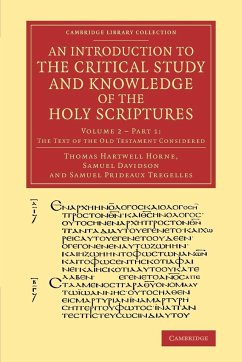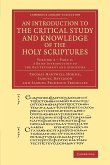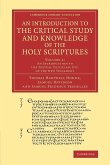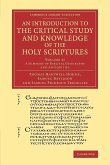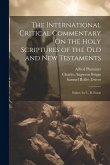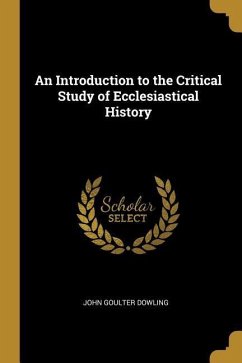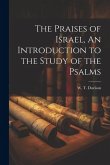Thomas Hartwell Horne, Samuel DavidsonVolume 2, the Text of the Old Testament Considered, Part 1
An Introduction to the Critical Study and Knowledge of the Holy Scriptures
Volume 2, the Text of the Old Testament Considered, Part 1
Herausgeber: Tregelles, Samuel Prideaux
Thomas Hartwell Horne, Samuel DavidsonVolume 2, the Text of the Old Testament Considered, Part 1
An Introduction to the Critical Study and Knowledge of the Holy Scriptures
Volume 2, the Text of the Old Testament Considered, Part 1
Herausgeber: Tregelles, Samuel Prideaux
- Broschiertes Buch
- Merkliste
- Auf die Merkliste
- Bewerten Bewerten
- Teilen
- Produkt teilen
- Produkterinnerung
- Produkterinnerung
Reissued in five parts, this is the revised four-volume tenth edition (1856) of an influential work of biblical scholarship.
Andere Kunden interessierten sich auch für
![An Introduction to the Critical Study and Knowledge of the Holy Scriptures An Introduction to the Critical Study and Knowledge of the Holy Scriptures]() Thomas Hartwell HorneAn Introduction to the Critical Study and Knowledge of the Holy Scriptures56,99 €
Thomas Hartwell HorneAn Introduction to the Critical Study and Knowledge of the Holy Scriptures56,99 €![An Introduction to the Critical Study and Knowledge of the Holy Scriptures An Introduction to the Critical Study and Knowledge of the Holy Scriptures]() Thomas Hartwell HorneAn Introduction to the Critical Study and Knowledge of the Holy Scriptures78,99 €
Thomas Hartwell HorneAn Introduction to the Critical Study and Knowledge of the Holy Scriptures78,99 €![An Introduction to the Critical Study and Knowledge of the Holy Scriptures An Introduction to the Critical Study and Knowledge of the Holy Scriptures]() Thomas Hartwell HorneAn Introduction to the Critical Study and Knowledge of the Holy Scriptures73,99 €
Thomas Hartwell HorneAn Introduction to the Critical Study and Knowledge of the Holy Scriptures73,99 €![The International Critical Commentary On the Holy Scriptures of the Old and New Testaments: Esther, by L. B. Paton The International Critical Commentary On the Holy Scriptures of the Old and New Testaments: Esther, by L. B. Paton]() Samuel Rolles DriverThe International Critical Commentary On the Holy Scriptures of the Old and New Testaments: Esther, by L. B. Paton27,99 €
Samuel Rolles DriverThe International Critical Commentary On the Holy Scriptures of the Old and New Testaments: Esther, by L. B. Paton27,99 €![An Introduction to the Critical Study of Ecclesiastical History An Introduction to the Critical Study of Ecclesiastical History]() John Goulter DowlingAn Introduction to the Critical Study of Ecclesiastical History27,99 €
John Goulter DowlingAn Introduction to the Critical Study of Ecclesiastical History27,99 €![The Praises of Israel, An Introduction to the Study of the Psalms The Praises of Israel, An Introduction to the Study of the Psalms]() William Theophilus DavisonThe Praises of Israel, An Introduction to the Study of the Psalms26,99 €
William Theophilus DavisonThe Praises of Israel, An Introduction to the Study of the Psalms26,99 €![The Book of Job: Critical Edition of the Hebrew Text The Book of Job: Critical Edition of the Hebrew Text]() Carl SiegfriedThe Book of Job: Critical Edition of the Hebrew Text18,99 €
Carl SiegfriedThe Book of Job: Critical Edition of the Hebrew Text18,99 €-
-
-
Reissued in five parts, this is the revised four-volume tenth edition (1856) of an influential work of biblical scholarship.
Hinweis: Dieser Artikel kann nur an eine deutsche Lieferadresse ausgeliefert werden.
Hinweis: Dieser Artikel kann nur an eine deutsche Lieferadresse ausgeliefert werden.
Produktdetails
- Produktdetails
- Verlag: Cambridge University Press
- Seitenzahl: 612
- Erscheinungstermin: 17. Oktober 2013
- Englisch
- Abmessung: 229mm x 152mm x 36mm
- Gewicht: 980g
- ISBN-13: 9781108067737
- ISBN-10: 1108067735
- Artikelnr.: 40055775
- Herstellerkennzeichnung
- Libri GmbH
- Europaallee 1
- 36244 Bad Hersfeld
- gpsr@libri.de
- Verlag: Cambridge University Press
- Seitenzahl: 612
- Erscheinungstermin: 17. Oktober 2013
- Englisch
- Abmessung: 229mm x 152mm x 36mm
- Gewicht: 980g
- ISBN-13: 9781108067737
- ISBN-10: 1108067735
- Artikelnr.: 40055775
- Herstellerkennzeichnung
- Libri GmbH
- Europaallee 1
- 36244 Bad Hersfeld
- gpsr@libri.de
Preface
Part I. Criticism of the Old Testament: 1. Preliminary
2. Languages of the Old Testament
3. The Hebrew characters
4. Hebrew vowel points
5. Hebrew accents
6. Means by which a knowledge of the Hebrew language may be acquired
7. Criticism of the text
8. History of the text itself
9. History of the printed text
10. Sources of criticism
11. The Septuagint translation
12. Other ancient Greek versions
13. Versions from the Septuagint
14. Venetian-Greek version
15. Targums
16. Old Syriac version
17. Arabic translations
18. Samaritan version of the Pentateuch
19. Vulgate version
20. Versions made from the Vulgate
21. Rules for using versions
22. Hebrew manuscripts
23. A few of the oldest MSS described
24. Parallel passages
25. Quotations
26. Critical conjectures
27. Application of the sources of criticism
28. Table of the quotations from the Old Testament in the New
29. Sources whence quotations were taken
30. Introductory formulas of quotations
31. On the external form of quotations
32. On the internal form of quotations
Part II. Biblical Interpretation, Book 1: 1. Qualifications necessary to a good interpreter
2. Grammatical interpretation
3. Study of the text itself
4. Study of the context
5. Study of parallels
6. External sources of grammatical interpretation
7. Biblical exegesis
8. Examination of the passage itself
9. Examination of context
10. Parallels, or parallel passages
11. Analogy of faith
12. Ancient versions
13. On historical circumstances
14. External circumstances
15. On Jewish writings as aids in interpretation
16. Assistance derivable from the Greek fathers in the interpretation of scriptures
17. Limitations and cautions in the exegesis of the Bible
18. Commentaries
Part II. Biblical Interpretation, Book II: 1. Interpretation of the figurative language of scripture
2. On the interpretation of the metonymies occurring in the scriptures
3. On the interpretation of scripture metaphors
4. Anthropopathy and personification
5. Allegory
6. On the interpretation of scripture parables
7. On the interpretation of scripture proverbs
8. The interpretation of the poetical parts of scripture
9. On the interpretation of types
10. On the interpretation of prophecy
11. On the doctrinal interpretation of scripture
12. On the moral interpretation of scripture
13. On the interpretation of the promises and threatenings of scripture
14. On the interpretation and means of harmonising passages of scripture which appear to be contradictory
15. On the inferential reading of scripture
16. On the practical reading of scripture.
Part I. Criticism of the Old Testament: 1. Preliminary
2. Languages of the Old Testament
3. The Hebrew characters
4. Hebrew vowel points
5. Hebrew accents
6. Means by which a knowledge of the Hebrew language may be acquired
7. Criticism of the text
8. History of the text itself
9. History of the printed text
10. Sources of criticism
11. The Septuagint translation
12. Other ancient Greek versions
13. Versions from the Septuagint
14. Venetian-Greek version
15. Targums
16. Old Syriac version
17. Arabic translations
18. Samaritan version of the Pentateuch
19. Vulgate version
20. Versions made from the Vulgate
21. Rules for using versions
22. Hebrew manuscripts
23. A few of the oldest MSS described
24. Parallel passages
25. Quotations
26. Critical conjectures
27. Application of the sources of criticism
28. Table of the quotations from the Old Testament in the New
29. Sources whence quotations were taken
30. Introductory formulas of quotations
31. On the external form of quotations
32. On the internal form of quotations
Part II. Biblical Interpretation, Book 1: 1. Qualifications necessary to a good interpreter
2. Grammatical interpretation
3. Study of the text itself
4. Study of the context
5. Study of parallels
6. External sources of grammatical interpretation
7. Biblical exegesis
8. Examination of the passage itself
9. Examination of context
10. Parallels, or parallel passages
11. Analogy of faith
12. Ancient versions
13. On historical circumstances
14. External circumstances
15. On Jewish writings as aids in interpretation
16. Assistance derivable from the Greek fathers in the interpretation of scriptures
17. Limitations and cautions in the exegesis of the Bible
18. Commentaries
Part II. Biblical Interpretation, Book II: 1. Interpretation of the figurative language of scripture
2. On the interpretation of the metonymies occurring in the scriptures
3. On the interpretation of scripture metaphors
4. Anthropopathy and personification
5. Allegory
6. On the interpretation of scripture parables
7. On the interpretation of scripture proverbs
8. The interpretation of the poetical parts of scripture
9. On the interpretation of types
10. On the interpretation of prophecy
11. On the doctrinal interpretation of scripture
12. On the moral interpretation of scripture
13. On the interpretation of the promises and threatenings of scripture
14. On the interpretation and means of harmonising passages of scripture which appear to be contradictory
15. On the inferential reading of scripture
16. On the practical reading of scripture.
Preface
Part I. Criticism of the Old Testament: 1. Preliminary
2. Languages of the Old Testament
3. The Hebrew characters
4. Hebrew vowel points
5. Hebrew accents
6. Means by which a knowledge of the Hebrew language may be acquired
7. Criticism of the text
8. History of the text itself
9. History of the printed text
10. Sources of criticism
11. The Septuagint translation
12. Other ancient Greek versions
13. Versions from the Septuagint
14. Venetian-Greek version
15. Targums
16. Old Syriac version
17. Arabic translations
18. Samaritan version of the Pentateuch
19. Vulgate version
20. Versions made from the Vulgate
21. Rules for using versions
22. Hebrew manuscripts
23. A few of the oldest MSS described
24. Parallel passages
25. Quotations
26. Critical conjectures
27. Application of the sources of criticism
28. Table of the quotations from the Old Testament in the New
29. Sources whence quotations were taken
30. Introductory formulas of quotations
31. On the external form of quotations
32. On the internal form of quotations
Part II. Biblical Interpretation, Book 1: 1. Qualifications necessary to a good interpreter
2. Grammatical interpretation
3. Study of the text itself
4. Study of the context
5. Study of parallels
6. External sources of grammatical interpretation
7. Biblical exegesis
8. Examination of the passage itself
9. Examination of context
10. Parallels, or parallel passages
11. Analogy of faith
12. Ancient versions
13. On historical circumstances
14. External circumstances
15. On Jewish writings as aids in interpretation
16. Assistance derivable from the Greek fathers in the interpretation of scriptures
17. Limitations and cautions in the exegesis of the Bible
18. Commentaries
Part II. Biblical Interpretation, Book II: 1. Interpretation of the figurative language of scripture
2. On the interpretation of the metonymies occurring in the scriptures
3. On the interpretation of scripture metaphors
4. Anthropopathy and personification
5. Allegory
6. On the interpretation of scripture parables
7. On the interpretation of scripture proverbs
8. The interpretation of the poetical parts of scripture
9. On the interpretation of types
10. On the interpretation of prophecy
11. On the doctrinal interpretation of scripture
12. On the moral interpretation of scripture
13. On the interpretation of the promises and threatenings of scripture
14. On the interpretation and means of harmonising passages of scripture which appear to be contradictory
15. On the inferential reading of scripture
16. On the practical reading of scripture.
Part I. Criticism of the Old Testament: 1. Preliminary
2. Languages of the Old Testament
3. The Hebrew characters
4. Hebrew vowel points
5. Hebrew accents
6. Means by which a knowledge of the Hebrew language may be acquired
7. Criticism of the text
8. History of the text itself
9. History of the printed text
10. Sources of criticism
11. The Septuagint translation
12. Other ancient Greek versions
13. Versions from the Septuagint
14. Venetian-Greek version
15. Targums
16. Old Syriac version
17. Arabic translations
18. Samaritan version of the Pentateuch
19. Vulgate version
20. Versions made from the Vulgate
21. Rules for using versions
22. Hebrew manuscripts
23. A few of the oldest MSS described
24. Parallel passages
25. Quotations
26. Critical conjectures
27. Application of the sources of criticism
28. Table of the quotations from the Old Testament in the New
29. Sources whence quotations were taken
30. Introductory formulas of quotations
31. On the external form of quotations
32. On the internal form of quotations
Part II. Biblical Interpretation, Book 1: 1. Qualifications necessary to a good interpreter
2. Grammatical interpretation
3. Study of the text itself
4. Study of the context
5. Study of parallels
6. External sources of grammatical interpretation
7. Biblical exegesis
8. Examination of the passage itself
9. Examination of context
10. Parallels, or parallel passages
11. Analogy of faith
12. Ancient versions
13. On historical circumstances
14. External circumstances
15. On Jewish writings as aids in interpretation
16. Assistance derivable from the Greek fathers in the interpretation of scriptures
17. Limitations and cautions in the exegesis of the Bible
18. Commentaries
Part II. Biblical Interpretation, Book II: 1. Interpretation of the figurative language of scripture
2. On the interpretation of the metonymies occurring in the scriptures
3. On the interpretation of scripture metaphors
4. Anthropopathy and personification
5. Allegory
6. On the interpretation of scripture parables
7. On the interpretation of scripture proverbs
8. The interpretation of the poetical parts of scripture
9. On the interpretation of types
10. On the interpretation of prophecy
11. On the doctrinal interpretation of scripture
12. On the moral interpretation of scripture
13. On the interpretation of the promises and threatenings of scripture
14. On the interpretation and means of harmonising passages of scripture which appear to be contradictory
15. On the inferential reading of scripture
16. On the practical reading of scripture.

